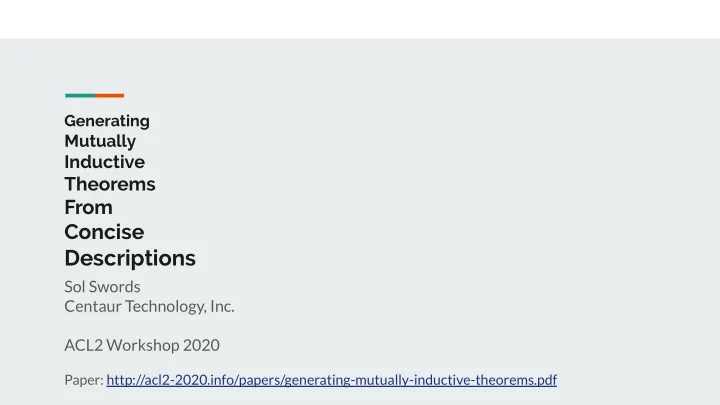

Generating Mutually Inductive Theorems From Concise Descriptions Sol Swords Centaur Technology, Inc. ACL2 Workshop 2020 Paper: http://acl2-2020.info/papers/generating-mutually-inductive-theorems.pdf
Proofs about Mutual Recursions Aren’t Hard What gets in the way? Induction schemes aren’t provided by ACL2 as with singly-recursive functions ● Needs some extra work, but this can be automated ○ Usually need a (slightly different) theorem about each function in the clique ● Tedious to list all the theorems by hand when the clique is large ○
Contribution: defret-mutual-generate Generates a mutually-inductive clique of theorems from a set of rules ● Rules based on info recorded by defines : input/output names and types ● Wraps around existing macro defret-mutual ● Which itself wraps flag defthm macros generated by make-flag ○
Case Study: FGL Rewriter 49-function clique defined in centaur/fgl/interp.lisp ● 22 sets of theorems generated using defret-mutual-generate ● 17 mutual inductions, 5 per-function corollaries ○ Average 41 lines per defret-mutual-generate form ● Dominated by one 430-line form ○ Average 23 lines omitting the one outlier ○ The simplest of these produce ~300 lines of defthm forms (not counting local helper events). ○ Keeps DRY and maintainable ● Most changes to rewriter require only small changes to few of the theorem forms. ○
Quick background: make-flag Generates a flag function from a mutual recursion for use as an induction scheme (defun-nx subst-term-flag (flag x alist) (cond ((equal flag ‘subst-term) (cond … (t (cons (car x) (subst-term-flag ‘subst-termlist (cdr x) alist))))) (t ;; (equal flag ‘subst-termlist) (if (atom x) nil (cons (subst-term-flag ‘subst-term (car x) alist) (subst-term-flag ‘subst-termlist (cdr x) alist))))))
Quick background: make-flag Also a flag defthm macro : (defthm-subst-term-flag (defthm ev-term-of-subst-term (equal (ev-term (subst-term x alist) env) (ev-term x (ev-alist alist env))) :flag subst-term) (defthm ev-termlist-of-subst-termlist (equal (ev-termlist (subst-termlist x alist) env) (ev-termlist x (ev-alist alist env))) :flag subst-termlist))
Quick background: make-flag (defthm flag-lemma-for-ev-term-of-subst-term (cond ((equal flag ‘subst-term) (equal (ev-term (subst-term x alist) env) (ev-term x (ev-alist alist env)))) (t ;; subst-termlist (equal (ev-termlist (subst-termlist x alist) env) (ev-termlist x (ev-alist alist env))))) :hints ((“goal” :induct (subst-term-flag flag x alist)) …) :rule-classes nil)
Quick background: define , defines Define/defines are like defun/mutual-recursion but allow specifying/storing some extra info. Relevant to us: types of formals, types and names of return values (defines fgl-interp (define fgl-interp-term ((x pseudo-termp) (interp-st interp-st-bfrs-ok) state) :returns (mv (xobj fgl-object-p) new-interp-st new-state) ...) ...)
Quick background: defret , defret-mutual Mostly like defthm but creates hidden bindings of return names to their values (defret interp-st-scratch-isomorphic-of-<fn> (interp-st-scratch-isomorphic new-interp-st (double-rewrite interp-st)) :fn fgl-interp-term) → (defthm interp-st-scratch-isomorphic-of-fgl-interp-term (b* (((mv ?xobj ?new-interp-st ?new-state) (fgl-interp-term x interp-st state))) (interp-st-scratch-isomorphic new-interp-st (double-rewrite interp-st))))
Defret-mutual-generate : Minimal example (std::defret-mutual-generate interp-st-scratch-isomorphic-of-<fn> :return-concls ((new-interp-st (interp-st-scratch-isomorphic new-interp-st (double-rewrite interp-st)))) :hints ((fgl-interp-default-hint 'fgl-interp-term id nil world)) :mutual-recursion fgl-interp)
Rules Rules take the form condition → action, e.g.: ( condition ) If a function has a return value named new-interp-st , then ( action ) Add the following expression as a conclusion.
Example conditions Function’s name is foo ● Function has a formal of type fancy-objtype ● Function has a return value named blob ●
Example actions Add term as a conclusion or hypothesis ● Add b* bindings around the hypotheses and conclusion ● For each formal of type integerp , add hypothesis (natp x) where x is the formal name ● For each return value of type stringp , add conclusion (< (length x) 5) where x is the ● return value name Add a keyword to the defthm form ● Set the the theorem name to the given template ●
Shortcuts :formal-hyps generates hypotheses for formals of the given name or type ● :return-concls generates conclusions for return values of the given name or type ●
(std::defret-mutual-generate interp-st-bfrs-ok-of-<fn> :rules ((t (:add-bindings ((?new-logicman (interp-st->logicman new-interp-st)) (?logicman (interp-st->logicman interp-st))))) ((or (:fnname fgl-rewrite-try-rules) (:fnname fgl-rewrite-try-rule) (:fnname fgl-rewrite-try-rewrite) (:fnname fgl-rewrite-try-meta) (:fnname fgl-rewrite-binder-try-rules) (:fnname fgl-rewrite-binder-try-rule) (:fnname fgl-rewrite-binder-try-rewrite) (:fnname fgl-rewrite-binder-try-meta) (:fnname fgl-rewrite-try-rules3)) (:add-hyp (scratchobj-case (stack$a-top-scratch (double-rewrite (interp-st->stack interp-st))) :fgl-objlist)))) :formal-hyps ;; generates hypotheses (((interp-st-bfr-p x) (lbfr-p x logicman)) ((fgl-object-p x) (lbfr-listp (fgl-object-bfrlist x) logicman)) ((fgl-objectlist-p x) (lbfr-listp (fgl-objectlist-bfrlist x) logicman)) ((fgl-object-bindings-p x) (lbfr-listp (fgl-object-bindings-bfrlist x) logicman)) (interp-st (interp-st-bfrs-ok interp-st)) ((constraint-instancelist-p x) (lbfr-listp (constraint-instancelist-bfrlist x) logicman))) :return-concls ;; generates conclusions ((xbfr (lbfr-p xbfr new-logicman)) ((fgl-object-p x) (lbfr-listp (fgl-object-bfrlist x) new-logicman)) ((fgl-objectlist-p x) (lbfr-listp (fgl-objectlist-bfrlist x) new-logicman)) (new-interp-st (interp-st-bfrs-ok new-interp-st))) :hints ((fgl-interp-default-hint 'fgl-interp-term id nil world)) :mutual-recursion fgl-interp)
Future possibilities Apply same idea to automate theorems on sets of functions that are not all mutually recursive ● Allow annotations of formals and returns and recognize them in rule conditions ●
Conclusion Greatly reduces the size of forms, amount of editing for proving theorems about large cliques. ● Low requirements: use defines, add formal types, return value names/types. ● Documentation: std::defret-mutual-generate ● Mutual recursions are fine! Even big ones. No need to avoid them. ● Big cliques are preferable to big functions. ○
Recommend
More recommend